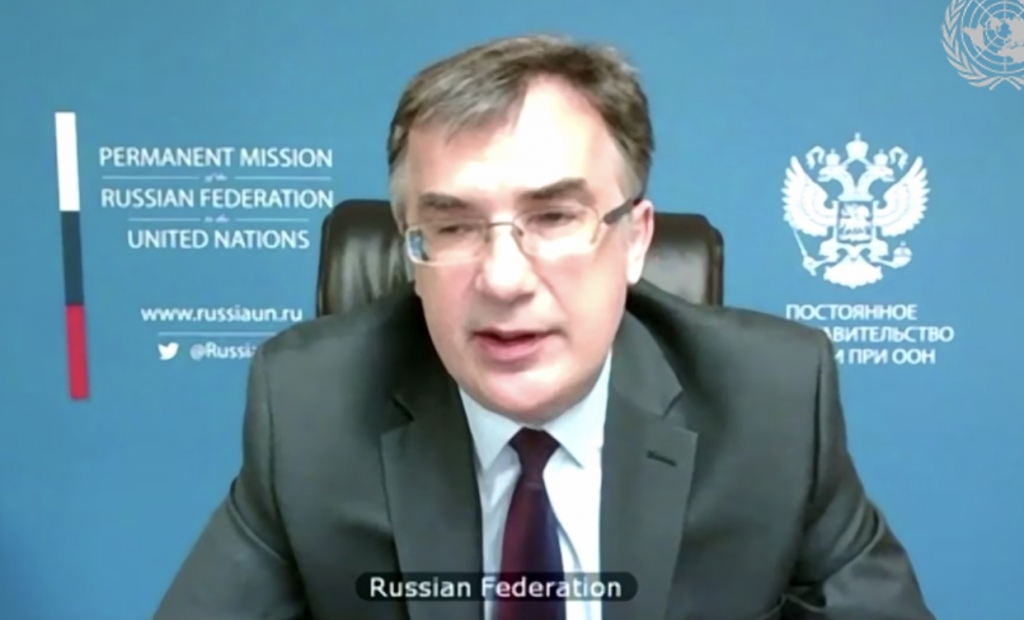Statement by Deputy Permanent Representative Gennady Kuzmin at an open VTC of UNSC members "Protection of civilians in armed conflict"
Mr. President,
We thank the Chinese delegation for the initiative to address protection of civilians in armed conflict. We also thank USG Lowcock, President of the ICRC Mr. Peter Maurer, as well as Ms.Nemat for their valuable contribution to this discussion.
The depressing situation with protection of civilian population during armed action proves that this issue must remain a priority on the UNSC agenda. Even though there is a toolkit of international legal instruments, designed to ensure observance of the international humanitarian law, peaceful population still falls victim to armed action.
Russia strongly condemns the practice of intended attacks on civilians, as well as casualties resulting from indiscriminate or disproportionate use of force in violation of the IHL provisions.
We welcome the useful initiatives aimed at minimizing the sufferings of the civilian population. The adoption of UNSC resolution 2573 “Protection of Objects Indispensable to the Survival of the Civilian Population” in April this year upon Viet Nam’s initiative was an example of a weighed and highly demanded step in this area.
At the same time, we call to not be too keen on inventing new international legal concepts that are allegedly meant to bridge the “gaps” in the protection regime established by the Geneva Conventions. Also, the advantage of establishing further categories of individuals requiring special protection does not seem quite obvious. In practice, such an approach leads to the opposite results – it differentiates the legal regime and loosens protection that civilians may receive.
Mr. President,
The Security Council has been mandated with a task of utmost importance – maintenance of international peace and security. Prevention and peaceful settlement of armed conflicts is something that can really guarantee that people’s lives be protected.
We are very concerned over the situation in Afghanistan. According to the UNSG report, this country encounters the highest toll among civilians. The recent escalation in the area of Palestinian-Israeli conflict is also very worrisome: missile attacks from Gaza and strikes of the Israeli air force against densely populated areas resulted in numerous casualties, ruined buildings and civil infrastructure. The conflict rate in Africa is also growing. Civilians keep dying under shellfire in eastern Ukraine, where the Kiev authorities have waged an undeclared war on their own population for several years by now.
Russia strongly advocates that all who are responsible for crimes against civilians in armed conflict must be held duly accountable. However this must happen in full compliance with the norms of law and never be an instrument of political manipulation. The major role here is to be played by national legal systems.
Terrorist groups taking part in armed conflicts pose a particular threat to civilians today. As we see from the cases of Syria and Iraq, such groups carry out mass executions, use civil facilities as “shelter” and civilians – as a “human shield”, create obstacles for humanitarian deliveries. We stand for strengthening international cooperation in countering terrorism under UN auspices.
Humanitarian component is an important factor for the protection of civilians. Unprecedented politicizing of humanitarian activity that we witness today runs counter to the stance towards preventing and minimizing sufferings of civilian population. It is imperative for humanitarian organizations to follow scrupulously the guiding principles of humanitarian assistance articulated in UNGA resolutions. We strongly condemn the practice of citing humanitarian pretexts in order to render assistance to terrorists and spread disinformation.
Mr. President, in conclusion I would like to make the following point.
Against the backdrop of eloquent rhetoric promoting the protection of civilians, the practice of introducing unilateral measures for illegal sanction pressure by some states looks particularly hypocritical. Attempted economic suffocation of disloyal governments in reality turns into an act of inflicting direct and irreparable damage on civilians. In this regard, we remind of the Secretary-General’s call to waive sanctions that limit deliveries of basic necessities, food, medicines, and equipment for restoration of critical infrastructure to civilians in conflict.
Thank you.
